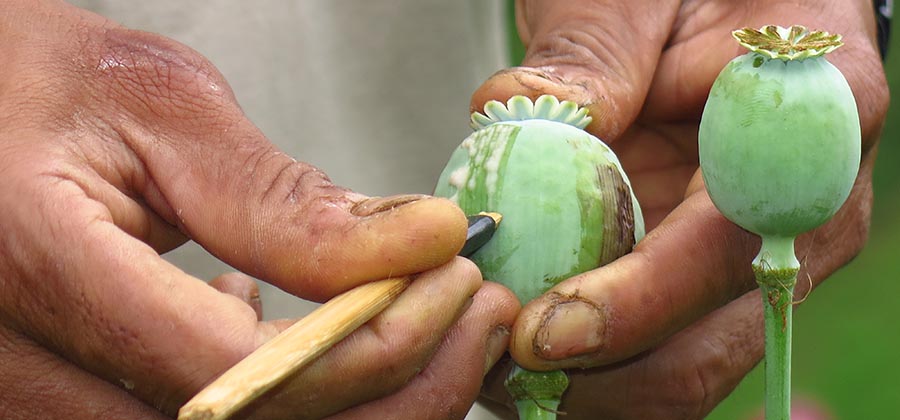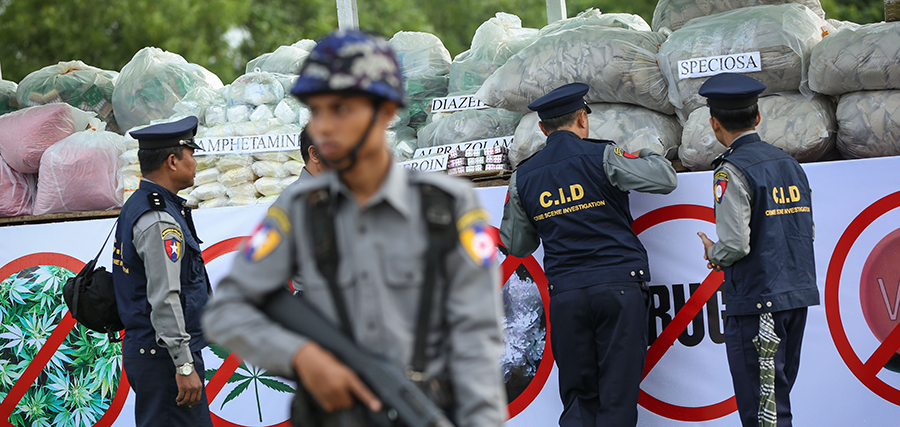A recent string of drug busts in Southeast Asia — 55 million methamphetamine pills and 1.5 tonnes of crystal meth in Laos in October, and this year at least a billion pills, 6 tonnes of heroin and 4.4 tonnes of crystal meth — have led some international agencies to conclude that the production of illicit narcotics in the region is booming. The reason, Jeremy Douglas from the United Nations Office on Drugs and Crime (UNODC) in Bangkok told Reuters as far back as Oct. 28, is “the breakdown” of “security and governance” in Myanmar’s Shan State following the coup a year ago. Then, on Dec. 12, the Australian Broadcasting Corporation quoted Douglas as saying that “right now, the [Myanmar] police are fighting an insurgency or dealing with ethnic unrest, so they have other issues on their mind, and there is free space for others [drug smugglers] to do their business.” More recently, on Feb. 1, Douglas told Reuters: “Meth production increased last year from already extreme levels in northern Myanmar and there is no sign it will slow down.”
Critics, however, see the problem in a completely different light. Apart from being disconcerted by Douglas’ offensive choice of words — “other issues on their mind” can only be interpreted as a reference to the police gunning down peaceful demonstrators — they are pointing out that there can be many reasons for the increase in drug busts, and that it does not necessarily mean that production is skyrocketing. The Transnational Institute (TNI), a Netherlands-based research and advocacy organization, stated in a report published in December: “Sweeping assertions that Myanmar has become one of the world’s largest ATS [Amphetamine-Type Stimulants] producers — if not the largest — and reports about sudden huge increases in production should…be treated with great caution. It is important to note that increases in seizures could be because of other reasons, and these do not automatically mean that there is an increased equivalent in production.”
An obvious reason in today’s context would be that the COVID-19 pandemic has prompted border security forces in, for instance, Thailand and Laos, to step up surveillance of all movements across their respective borders. Another could be that new couriers have been recruited, and they are taking risks that more experienced smugglers would not. Or there is no particular reason. The number of seizures and the amounts of drugs confiscated always fluctuate regardless of the level of production.
The TNI also points out that the production of ATS, among them methamphetamine, or ya ba (“madness medicine”), is entirely dependent on the availability of chemicals that have been diverted from legal markets, and does not require the cultivation of specific crops like the opium poppy (from which heroin can be made), which can be monitored via satellite imagery and field surveys. The ease with which ATS production can be concealed, therefore, makes production estimates extremely unreliable.
A source familiar with the Golden Triangle drug trade stated quite bluntly in an interview with The Irrawaddy: “All those claims about large increases are based only on information gathered from police reports about seizures, and not on any real on-the-ground research.” The claim that Myanmar’s police resources have been diverted from drug suppression to performing “other issues” is equally problematic. In fact, there have been no credible reports of police units being sent away from the Golden Triangle to contain unrest in other parts of the country.
Reflecting the same point of view as Douglas, Richard Horsey, Myanmar adviser to the International Crisis Group, told the Financial Times in an article published on Aug. 22: “What the [Feb. 1] coup has done is completely distract the police from anti-drug activities” and “created a perfect storm for these criminal organizations, who thrive in the gaps where justice authorities can’t easily get.” That, in turn, would mean that the same “justice authorities” that are now meting out stiff sentences, including the death penalty, to pro-democracy activists would otherwise be going after drug traffickers.
The critics point out that similar misrepresentations of developments in the region’s drug production were made after the massive 1988 pro-democracy uprising. When Myanmar’s production of opium and its derivative heroin reached record levels in the late 1980s and early 1990s, Daniel O’Donahue, a former US ambassador to Thailand and Myanmar, said in an interview published in the July 14, 1989 issue of the Bangkok Post that “many Burma [Myanmar] Army troops, previously dedicated to anti-narcotics operations, were withdrawn from the field and redeployed to enforce martial law.” In reality, the forces that were used to quell the demonstrations in 1988 and then to hunt down pro-democracy activists in hiding came mainly from the 22nd and 44th Light Infantry Divisions from Karen State, where no poppies were grown.
The problem with the UNODC, critics say, is that the organization has no choice but to cooperate with often corrupt authorities in countries where it operates and, therefore, has a long history of turning a blind eye to official complicity in the drug trade. In 2019, the UNODC released a report claiming that “the highest density of poppy cultivation took place [the year before] in areas under the control of…the Kachin Independence Army (KIA),” referring to an ethnic armed organization active in Kachin State.

The KIA’s political wing, the Kachin Independence Organization, was the first to respond to the report, pointing out in a statement in March 2019 that even the UNODC’s own map in the report showed the state’s poppy cultivation was not in rebel-held areas, but rather where government-recognized militias and Border Guard Forces allied with the Myanmar military hold sway. On March 5, 2019, the TNI issued a statement saying “passing the blame for the drugs problems in Myanmar – in this case opium cultivation – has long been practised by different local and international actors. Such accusations serve as a distraction, ignore realties in the field, and allow high levels of corruption and a multi-million dollar drug trade to flourish in the region.”
The UNODC actually has a long history of covering up official complicity in the drug trade and blaming it on Myanmar’s ethnic armed organizations. While referring to information provided by the UNODC, Reuters stated in its Feb. 1 report that drug production in the Golden Triangle is “run by Asian crime gangs in partnership with armed factions from some of Myanmar’s ethnic minorities” — and then not a word about the real culprits, the Myanmar military’s local, armed allies which are responsible for most of the Golden Triangle drug trade.
Other misinterpretations of the Golden Triangle drug trade came in 2019, when the UNODC and some Western anti-narcotics officials claimed that the region had a new “kingpin”. His name was Tse Chi Lop, a Chinese-born Canadian citizen also known as Sam Gor, or Brother No. 3 in Cantonese, who was reputedly the leader of a gang that then controlled most of the region’s illegal and wide-reaching methamphetamine trade. In October 2019, Reuters published an in-depth investigation exposing Tse’s new “Asian meth syndicate”, which according to the report controls the bulk of the region’s rampant trade in the narcotic. The Reuters report referred to him as “Asia’s most-wanted man” who runs a “vast multinational drug trafficking syndicate” in alliance with “five of Asia’s triad groups.”
The UNODC, the report said, estimated Tse’s syndicate’s 2018 revenues at US$8-17.7 billion, with Asian sales reaching from Japan to New Zealand. In the report, Douglas was quoted as saying: “Tse Chi Lop is in the league of El Chapo or maybe Pablo Escobar. The word kingpin often gets thrown around, but there is no doubt it applies here.” Other, more knowledgeable seasoned observers took issue with the Hollywood-like portrayal of Asia’s drug trade, which they argued is instead run by loosely and informally organized networks and not by an overarching, all-powerful “kingpin.”

Ko-lin Chin and Sheldon X. Zhang, two of America’s most accomplished criminologists, have shown in seminal books like “The Chinese Heroin Trade” and “The Golden Triangle: Inside Southeast Asia’s Drug Trade” as well as numerous papers and articles that “Chinese [drug and crime] networks are horizontally structured, fluid, and opportunistic.” They have also argued that, in private conversations, “even US drug enforcement officials in the field have acknowledged that there are no drug kingpins, or at least they have not seen any in China or Southeast Asia.”
Furthermore, Chin and Zhang state categorically in their books and research papers that they have never uncovered any evidence of significant triad involvement in the drug trade. Some triad members may deal in drugs but their main illicit income derives chiefly from enterprises such as construction, extortion, gambling, prostitution and fraud. Indeed, the use of the term “kingpin” is and has always been misleading when referring to narcotics suppression in the Golden Triangle and the term is often manufactured as a distractionary focal point while other actors — including supposedly legitimate businessmen and even state officials — wheel and deal narcotics under the radar. But naming and shaming such people could have diplomatic as well as legal consequences.
Then, on Jan. 21 last year, Tse Chi Lop was arrested by Dutch police in Schiphol Airport when he — rather astonishingly if he was such a notorious criminal — was changing planes on his way to Canada from Taiwan. And during the year that has elapsed since the arrest of “Asia’s El Chapo”, drug production in the Golden Triangle has, apparently, increased rather than suffered any major blows.
Recent UNODC claims about massive increases in narcotics production in Myanmar along with fanciful stories about kingpins may be questionable to say the least. But it is even more disturbing that the UNODC recently advertised on its website that it is looking for a new “drug control and crime prevention officer” to be based in Yangon. According to the announcement, the officer will “liaise with Government’s institutions (in line with the common UN position), civil society, regional and international aid agencies and financial institutions, and the media.” It is not specified which “Government” that might be, but because the office is located in Yangon, the reference is surely to the military regime’s current State Administration Council-appointed cabinet. That is also in line with inviting the junta’s deputy minister of home affairs, Lieutenant General Than Hlaing, to attend the 64th meeting of the Commission on Narcotic Drugs (CND) in Vienna in April last year. The CND is the UNODC’s governing body and the event was highly publicized in Myanmar’s now military-run media — but, predictably, drew criticism from civil society organizations. As a member of a ministry that controls both the police and the special branch, Lt-Gen Than Hlaing has since the coup played a central role in violent crackdowns on pro-democracy protests. The CND also overlooked the fact that he was, and still is, therefore officially blacklisted by both the European Union and the United States.
Despite such blunders, there is no denying that drug abuse is a major social problem in the region. According to official statistics from the various Southeast Asian countries, in 2019 there were no less than 9.86 million users of ATS-type drugs, while 3.67 million people used ecstasy, and 3.29 million users were addicted to opium or heroin. That means tens of millions of dollars in income to the traffickers and substantial amounts of money to corrupt police officers and other officials while many users have had to resort to crime to finance their habits. The sad reality, though, is that the UNODC has become part of the problem rather than the solution.
Bertil Lintner is a Swedish journalist, author and strategic consultant who has been writing about Asia for nearly four decades.
You may also like these stories:
UN Envoy Joins Her Predecessors in Myanmar’s ‘Graveyard of Diplomats’
A Textbook Example of Authoritarian Rule in Myanmar
















